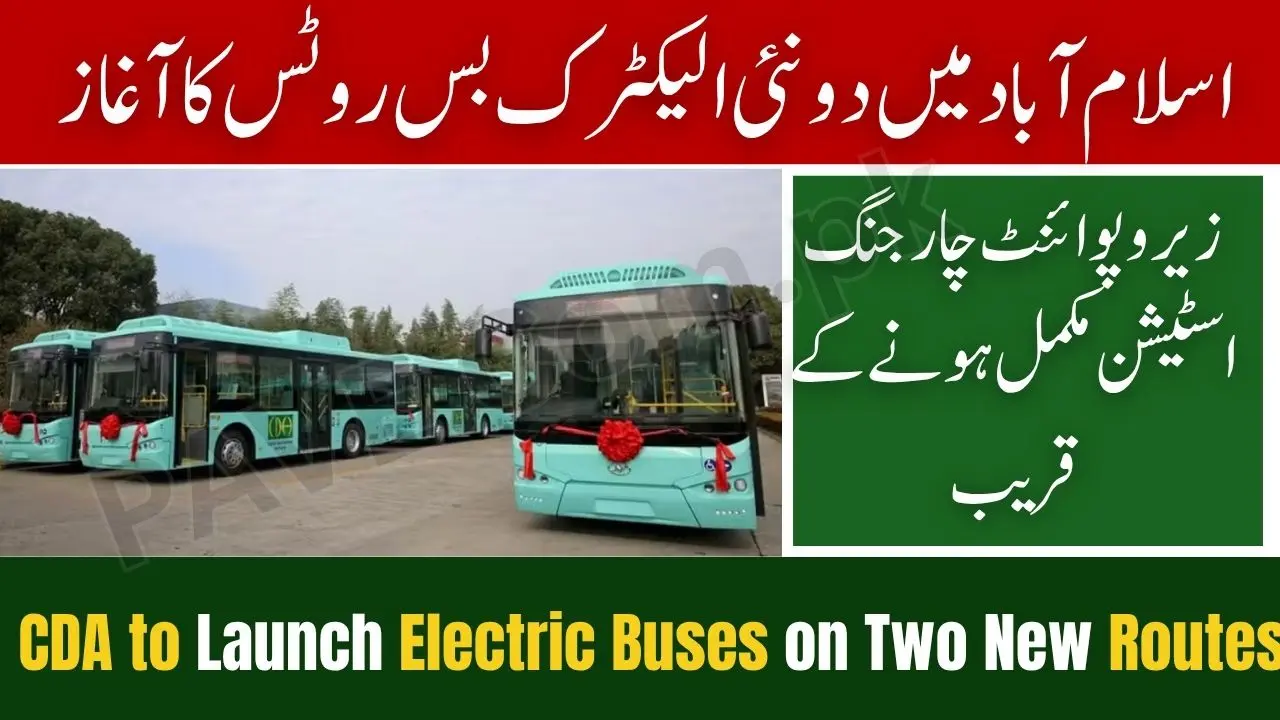Breaking News: CDA to Launch Electric Buses on Two New Routes — Zero Point Depot Nears Completion

The Capital Development Authority (CDA) has announced the launch of Electric Buses on Two New Routes in Islamabad as part of its ongoing efforts to modernize the city’s public transport system and promote eco-friendly mobility. The new routes — Khanapul to Nilor and G-9 to Faizabad — will become operational soon, marking another milestone in CDA’s clean and smart transport initiative.
This major development comes as the Zero Point electric bus charging depot nears completion. According to officials, 14 out of 20 charging points have already been installed, with integration expected to finish in the next two days. Once completed, the depot will be able to support the full fleet of CDA’s 160 electric buses — significantly improving Islamabad’s green transport capacity.
The CDA’s electric bus service, which began in 2025, is already transforming daily commuting in the capital. With new routes and expanded infrastructure, citizens will soon enjoy cleaner, quieter, and more affordable travel across major city zones.
⚡ Zero Point Charging Depot — Islamabad’s EV Power Hub
The Zero Point depot is the centerpiece of Islamabad’s electric transport network. The Rs. 1.5 billion project is designed to serve as a centralized charging and control facility for CDA’s entire EV fleet.
The depot includes two major sections:
- Site A: Already functional and partially operational.
- Site B: Under final finishing, which includes the Data and Command Center, expected to be completed by end of next month.
So far, 14 out of 20 chargers have been installed, with advanced grid connections allowing the simultaneous charging of multiple buses. Once fully operational, it will enable CDA to deploy all 160 electric buses daily without downtime.
“After completing the integration process in the next couple of days, our issue of limited charging capacity will be resolved. We expect to begin operations on the two new routes by Wednesday,” said a CDA official.
Check Also: Breaking News: CM Orders Health Screening for Special Children Across Punjab
🚌 Two New Electric Bus Routes Announced
Under the upcoming expansion, the CDA is launching two additional electric bus routes to enhance urban connectivity and accessibility:
- Route 1: Khanapul to Nilor
- Covers the southern stretch of Islamabad.
- Designed for students, workers, and residents commuting from rural suburbs.
- Includes stops near hospitals, universities, and new housing zones.
- Route 2: G-9 to Faizabad
- Focused on high-density commercial and residential areas.
- Links the Blue Area, I-8, and the twin cities through Faizabad Interchange.
- Expected to ease congestion and reduce travel times by 30%.
These routes are part of CDA’s broader Eco-Bus Network Plan, which aims to connect underserved areas with low-cost and emission-free public transport by mid-2026.
🌱 Supporting Pakistan’s Green Vision 2030
The electric bus initiative directly supports Pakistan’s National Electric Vehicle Policy (NEVP) 2025–2030, which targets 30% electrification of public transport fleets by 2030.
CDA’s EV fleet helps:
- Cut urban pollution: Each electric bus prevents up to 60 tons of CO₂ emissions annually.
- Reduce fuel imports: Shifting to electricity saves millions in imported diesel costs.
- Lower noise pollution: Offering smoother, quieter rides.
- Improve energy efficiency: EVs consume less energy per kilometer than conventional buses.
With Islamabad frequently ranking among the top polluted cities, this project plays a vital role in achieving Clean and Green Pakistan goals and sets a model for other provinces to follow.
🔋 NRTC’s Role in CDA’s Electric Bus Project
The National Radio Telecommunication Corporation (NRTC) — CDA’s official transport partner — has been managing daily operations of the electric bus fleet.
Key details include:
- Total buses imported: 160
- Currently operational: 130
- Remaining units (idle): 30 due to charging limitations
- Payment model: CDA pays NRTC per kilometer traveled by each bus
NRTC’s modern fleet is equipped with GPS systems, air conditioning, digital payment readers, and accessibility features for people with disabilities.
Once the Zero Point depot is fully functional, the remaining 30 buses will be deployed, covering the new routes and expanding the service to more than 23 routes across Islamabad.
🏗️ Project Timeline and Progress Update
| Project Phase | Details |
|---|---|
| Project Name | Zero Point Electric Bus Charging Depot |
| Authority | Capital Development Authority (CDA) |
| Cost | Rs. 1.5 billion |
| Start Date | January 2025 |
| Original Completion | June 2025 |
| Current Progress | 70% completed |
| Operational Chargers | 14 out of 20 installed |
| Integration | Expected in 2 days |
| Full Operation Start | Expected by Wednesday |
This project demonstrates CDA’s commitment to completing critical infrastructure on time despite technical and logistical challenges.
🧩 Overcoming Technical Challenges
Officials admitted that the main challenge delaying the project was limited charging capacity and software synchronization between charging stations and buses. However, the integration now entering final stages will address both issues.
Additionally, CDA’s engineering wing is installing a smart grid management system at Zero Point to monitor real-time energy consumption, battery health, and operational efficiency.
“Once the data center goes live, CDA will have complete control over energy distribution and charging schedules — ensuring no downtime,” said a project engineer.
🏙️ Smart and Digital Islamabad — A Broader Vision
The electric bus initiative complements CDA’s Smart Islamabad Transformation Plan, which includes several digital infrastructure projects:
- Cashless One Window System — digitizing payments and citizen services.
- E-Governance Platform — online records and real-time complaint tracking.
- Smart Street Lighting & Surveillance Systems — AI-based monitoring.
- Green Urban Mobility — electric buses, bikes, and smart parking.
Together, these projects represent CDA’s vision to turn Islamabad into Pakistan’s first digital and environmentally sustainable capital.
💬 Public and Environmental Impact
Citizens have already started experiencing benefits from CDA’s earlier electric routes, including reduced travel costs, less noise, and cleaner air. The expansion to Khanapul and Faizabad will increase ridership and ensure equitable access to public transport.
According to environmental analysts:
“CDA’s EV fleet could cut Islamabad’s transport-sector emissions by up to 25% within two years if full deployment continues as planned.”
Moreover, the use of renewable energy-powered chargers will make the fleet almost carbon-neutral by 2026, once the CDA solar project at Koral Depot is completed.
🚏 Future Expansion Plans
CDA plans to launch Phase-II of the project in mid-2026, adding more routes and expanding charging depots at Bhara Kahu, I-8, and Taramri. The next phase will also introduce smart ticketing systems, Wi-Fi-enabled buses, and a mobile app for real-time bus tracking.
Upcoming routes under study include:
- Bhara Kahu to PIMS Hospital
- I-8 to Blue Area
- Taramri to Rawal Dam
This expansion will link Islamabad’s suburban zones and provide students, workers, and tourists with a sustainable public transport option.
📉 Economic Efficiency and Sustainability
Electric buses are proving to be more cost-effective in the long run.
Compared to diesel buses:
- Maintenance costs are 40% lower.
- Energy consumption per kilometer is 50% cheaper.
- Operational life expectancy is 12 years or more.
Additionally, CDA pays contractors based on per-kilometer performance, ensuring accountability and efficiency while reducing idle time.
Check Also: 9 Departments Closed at KP’s Largest University Amid Plunging Admissions
❓ FAQs — CDA Electric Bus Expansion 2025:
Q1: What are the new electric bus routes in Islamabad?
The new routes are Khanapul–Nilor and G-9–Faizabad, scheduled to start this week.
Q2: How many electric buses are operational now?
Currently, 130 buses are running across 21 routes, with 30 more to be added after the Zero Point depot becomes fully functional.
Q3: What is the total cost of the charging depot project?
The depot project is worth Rs. 1.5 billion, covering two sites with advanced charging and monitoring facilities.
Q4: Who manages the electric bus operations?
The National Radio Telecommunication Corporation (NRTC) operates the fleet on behalf of CDA.
Q5: How does this project benefit citizens?
It offers affordable fares, clean air, and smart commuting, while reducing traffic congestion and fuel dependency.
Check Also: Maryam Nawaz Bike Scheme Punjab Government to Distribute 1 Lac E-Bikes
Conclusion — CDA to Launch Electric Buses on Two New Routes
The CDA’s launch of two new electric bus routes marks a significant step in Islamabad’s journey toward green urban mobility. With the Zero Point depot nearing completion and the entire EV fleet ready for deployment, the city is set to become a national model of sustainable public transport.
As Pakistan transitions toward a greener future, Islamabad stands at the forefront — proving that smart governance and clean technology can work hand in hand for a better tomorrow.





